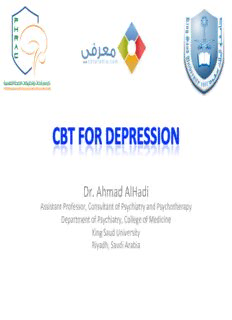
Dr. Ahmad AlHadi PDF
Preview Dr. Ahmad AlHadi
Dr. Ahmad AlHadi Assistant Professor, Consultant of Psychiatry and Psychotherapy Department of Psychiatry, College of Medicine King Saud University Riyadh, Saudi Arabia Agenda • IntroducCon • Depression • CBT • CBT for Depression • Behavioral acCvaCon • Summary & feedback Needs Assessment • What do you want from this workshop (CBT for Depression)? Objec0ves: • AMendants of this workshop will: 1. Know the basic concept of CBT. 2. Know the CBT techniques. 3. Learn how CBT can be used in treatment of Depression. Why Depression? • The 2nd leading cause for disability now • The 1st in 2020 • Chronic • Common Exercise • Write down as much as you can of Depression symptoms and signs in one minute. Major Depressive Disorder DSM5 Diagnos0c Criteria A. Five (or more)of the following symptoms have been present during the same 2-‐week period and represent a change from previous func0oning: at least one of the symptoms is either (1) depressed mood or (2) loss of interest or pleasure. Note: Do not include symptoms that are clearly aNributable to another medical condi0on. 1. Depressed mood most of the day, nearly every day, as indicated by either subjec0ve report (e.g., feels sad, empty, hopeless) or observa0on made by others (e.g., appears tearful). (Note: In children and adolescents, can be irritable mood.) 2. Markedly diminished interest or pleasure in all, or almost all, ac0vi0es most of the day, nearly every day (as indicated by either subjec0ve account or observa0on). 3. Significant weight loss when not die0ng or weight gain (e.g., a change of more than 5% of body weight in a month), or decrease or increase in appe0te nearly every day. (Note: In children, consider failure to make expected weight gain.) 4. Insomnia or hypersomnia nearly every day. Major Depressive Disorder DSM5 Diagnos0c Criteria 5. Psychomotor agita0on or retarda0on nearly every day (observable by others, not merely subjec0ve feelings of restlessness or being slowed down). 6. Fa0gue or loss of energy nearly every day. 7. Feelings of worthlessness or excessive or inappropriate guilt (which may be delusional) nearly every day (not merely self-‐reproach or guilt about being sick). 8. Diminished ability to think or concentrate, or indecisiveness, nearly every day (either by subjec0ve account or as observed by others). 9. Recurrent thoughts of death (not just fear of dying), recurrent suicidal idea0on with-‐ out a specific plan, or a suicide aNempt or a specific plan for commi[ng suicide. B. The symptoms cause clinically significant distress or impairment in social, occupa0onal, or other important areas of func0oning. C. The episode is not aNributable to the physiological effects of a substance or to another medical condi0on. Major Depressive Disorder DSM5 Diagnos0c Criteria Note: Criteria A-‐C represent a major depressive episode. D. The occurrence of the major depressive episode is not beMer explained by schizoaffecCve disorder, schizophrenia, schizophreniform disorder, delusional disorder, or other specified and unspecified schizophrenia spectrum and other psychoCc disorders. E. There has never been a manic episode or a hypomanic episode. Note: This exclusion does not apply if all of the manic-‐like or hypomanic-‐like episodes are substance-‐induced or are aMributable to the physiological effects of another medical condiCon. Diagnosis • one or more Major Depressive Episode . DSM-‐IV-‐TR diagnosCc criteria: A. At least 5 of the following, during the same 2-‐week period, represenCng a change from previous funcConing; must include either (a) or (b): 1. Depressed mood 2. Diminished interest or pleasure 3. Significant weight loss or gain (AppeCte) 4. Insomnia or hypersomnia (sleep) 5. Psychomotor agitaCon or retardaCon (acCvity) 6. FaCgue or loss of energy 7. Feelings of worthlessness (guilt) 8. Diminished ability to think or concentrate; indecisiveness 9. Recurrent thoughts of death, suicidal ideaCon, suicide aMempt, or specific plan for suicide
Description: